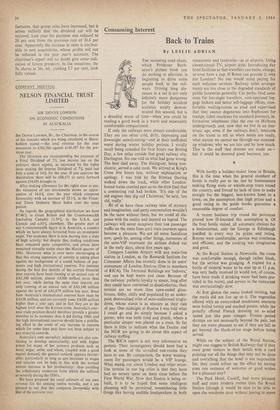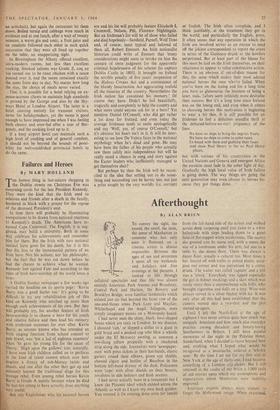Consuming Interest
Back to Trains
By LESLIE ADRIAN If only the railways were always comfortable. They are too often cold, dirty, depressing and downright unwelcoming—and at their inefficient worst during winter holiday periods. I vividly recall being stranded for four hours one Boxing Day, a few miles outside that great railway city, Darlington. No one told us what had gone wrong. The heat died away. The dining-car, being non- electric, served a cold meal. We arrived at King's Cross five hours late, without explanation or apology. I was told by the fireman (having walked down the track, while other London- bound trains crawled past us on the slow line) that a connecting rod had broken. 'It's one of the old engines they dig out Christmas,' he said, 'too old, really.'
All of us have these railway tales of mystery and imagination, and party conversation wouldn't be the same without them, but we could all dis- pense with the reality and depend on legend. The railways will never recapture their lost passenger traffic on the main lines until train journeys again become a pleasure. We are all more fastidious now, spoilt by, among other things, memories of the semi-VIP treatment the airlines dished out in the early days, about five years ago.
Compare London Airport with any main-line station in London, as the Research Institute for Consumer Affairs has recently done in its users' assessment of London Stations (free to members of RICA). The Terminal Buildings are 'indoors,' and can be kept warm and clean. Because of the railways' pathetic loyalty to steam, long after they could have converted to diesel-electric, their termini are no more than open-ended glass- houses, filthy, chilly and populated by an under- paid, demoralised tribe of semi-uniformed troglo- dytes, whose status is as obscure as their rate of pay. One midnight at Euston I was told what I could go and do simply because I asked a porter, who was both tired and drunk, where a particular sleeper was placed on a train. So far there is little to indicate what the Doctor and the NUR are going to do about this aspect of railway staffing, The RICA report is not very informative on porters. Their investigators should have had a look at some of the so-called rest-rooms they have to use. By comparison, the worst waiting- room for passengers would be a VIP lounge. What stands out about London and other main- line termini in our big cities is that they have had no money spent on them since before the First World War. Now that Euston is being re- built, it is to be hoped that some intelligent planning will be permitted, remembering little things like having audible loudspeakers in both
restaurants and lavatories—as at airports. Using closed-circuit TV, airport style. Introducing day hotel facilities so that travellers can bathe, change, or even have a nap. If Rome can provide it, why not London? No one would mind paying for such welcome services. Railway toilet arrange- ments are too close to the degraded standards of public lavatories generally. Car parks, food auto- mats for late-night travellers, coin-operated lug- gage lockers and better left-luggage offices, com- fortable waiting-rooms so sited and supervised that they cannot degenerate into flophouses for tramps, ticket machines for standard journeys, in- formation telephones (like the one on Holborn underground), and, now that we live in an elec- tronic age, even if the railways don't, intercom on the trains to tell us when meals are ready, what station we cannot see through our steamed- up windows, why we are late and by how much. This is the stuff that dreams are made on— but it could be damned good business, too.
With hardly a holiday-maker loose in Britain, this is the time when the general standard of hotels is really put to the test by businessmen making flying visits or whistle-stop tours round the country, and forced by lack of time to make straight for the biggest, best-known hotel in a town, on, the assumption that high prices and a good rating in the guide books guarantee a reasonable degree of comfort.
A recent business trip round the provinces proved how ill-founded this assumption is. Of the four hotels visited, all automatic choices for a businessman, only the George in Edinburgh justified in every' way its prices and rating. Rooms were comfortable, service was courteous and efficient, and the cooking was imaginative and good.
At the Royal Station in Newcastle, the room was comfortable enough, though rather bleak, but the service was grudging. A request for a bottle of mineral water to be sent up at 11 p.m. was very badly received (it would not, of course, have been made if drinking water had been pro- vided in the.room), and service in the restaurant was excruciatingly slow.
At first glance the menu looked inviting, but the meals did not live up to it. The vegetables offered with an overcooked mushroom omelette were boiled turnip and mashed potato, while the proudly offered French dressing on a- salad tasted just like pure vinegar. Frozen potted shrimps are not necessarily beyond the pale, but they are more pleasant to eat if they are left to get beyond the block-of-ice stage before being served.
While on the subject of the Royal Station, might one suggest to British Railways that if they Inust greet visitors to their hotels with a card pointing out all the things that may not be done and everything that the hotel is not responsible for, they could soften up the effect by having even one sentence of welcome or good wishes for a pleasant stay?
The Park Hotel, Cardiff, had more pleasant staff and more modern rooms than the Royal Station (though it would be nice to be able to open the wardrobe door without having to move an armchair), but again the restaurant let them down. Boiled turnip and cabbage were much in evidence and at one lunch, after a wait of twenty minutes, a warm,gin and tonic, a fruit juice and an omelette followed each other in such quick succession that they were all lined up together on the table, an unappetising sight.
In Birmingham the Albany offered excellent, ultra-modern rooms, but less than excellent cooking. Smoked salmon was Grade Z, coq au vin turned out to be roast chicken with a sauce poured over it, and the menu remained exactly the same from day to day. No matter how long the stay, the choice of meals never varied.
That it is possible for a hotel relying on ex- pense-account clients to maintain high standards is proved by the George and also by the Sky- ways Hotel at London Airport. The latter is a hotel catering entirely for transient visitors, never for holidaymakers, yet the menu is good enough to have impressed me when I was feeling both choosy and over-fed after a tour of Bur- gundy, and the cooking lived up to it.
If a busy airport hotel can maintain such a. high level of cooking and of general comfort, it should not be beyond the bounds of possi- bility for well-established provincial hotels to do the same.































 Previous page
Previous page